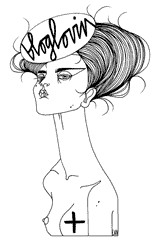Pinball, 1973 by Haruki Murakami
15 November, 2011
So I really enjoyed reading Hear the Wind Sing, Haruki Murakami’s debut novel, and went on to read its sequel, Pinball, 1973 straight away. It’s set three years on from the events in the first book and our narrator, still nameless, has set up a successful translation business with a friend, translating everything from manuals to adverts. The work isn’t too hard and there’s plenty of time to chill after he’s done his day’s worth. Still in his twenties, he hasn’t quite found his niche in life. One day he wakes up in bed with two girls, twins, and so starts their strange life together. And out of the blue comes a chance to reconnect with his favourite pinball machine, a legendary make that seemed to have vanished from the face of the earth. Back in his home town, his friend Rat is still going to J’s Bar and is still unhappy with his life, dropping out of university and several relationships until he too must make a decision about the direction of his life.
I have to confess I didn’t enjoy Pinball, 1973 as much as Hear the Wind Sing even though it has more of a cult following (probably because it’s much harder to get hold of outside Japan) mainly because the minutiae regarding the workings and the narrator’s obession with pinball machines somehow went straight over my head. Never played pinball and am not going to start now. And I wasn’t too tickled by the notion of the narrator, again nameless here, having a threesome with twins. There’s nothing really salacious in Murakami’s novel. It’s just….what is it with men and twins? I mean, would twin girls really want to share a boyfriend? Wouldn’t they want one just for themself? It’s just a bit icky. I’m not a twin so I can’t really understand how true fictional portrayals are although I suspect they tend to be rather extreme and fantastical.
Saying that, I did enjoy reading Pinball, 1973 just because of Murakami’s laconic style which always reminds me of a late summer’s afternoon, full of promise and languour. In some way’s, it’s a very geeky book and I suspect Murakami is a geek. The detail he goes into about translation work and pinball machines, the names of English songs and books. I read somewhere that Japanese critics have accused his novels of smelling like butter, meaning they’re too Westernised, but what’s wrong with writing about what you are into? And you can tell Murakami is totally in love with American culture because it shows in his writing. And I say, bully for him. I see echoes of the American style and vision that was prevalent in Japan when I was growing up there just as it is in his books. Japanese people may be falling out of love with America and its culture, but in the 70s and 80s, it was all the rage.
Murakami captures life in your twenties perfectly. It’s nostalgic and slightly romantic, something I yearned for in my twenties when I was busy studying and getting way too drunk. But looking back, it was a magical time.
Like with Hear the Wind Sing, I had no issues with Alfred Birnbaum’s translation of Pinball, 1973 and found it very easy to immerse myself into the book, although I know there have been many criticisms.
And do check out Stu and Tony’s posts on Pinball, 1973 too.
I read this as part of the Japanese Literature Challenge 5 and the Haruki Murakami Reading Challenge 2011.












16 November, 2011 at 6:40 am
I like the twenties bit – it is always so nostalgic and romantic to look back on what one did. I have read just one of his books but will be looking out for more.
16 November, 2011 at 9:50 am
Definitely very Americanised – Murakami is one J-Lit writer whose books need to be translated by an American really. If only there was more done in our language though…
17 November, 2011 at 11:37 am
I agree with the nostalgia feel ,it may be isn’t his best book but I m so happy I read it as it showed him devolping as a writer and many thanks for the mention ,all the best
18 November, 2011 at 7:44 pm
I remember feeling very excited to have gotten hold of his first two books. It’s evident that he was still honing his writing skills, but there’s really nothing wrong with that. Both books read like a breeze (on a pleasant summer day), so I completely agree with you in that regard 🙂 The twins. Heh. Had forgotten about those. A bit odd, indeed, but they didn’t leave a deep impression on me. Just like the books themselves :S
21 November, 2011 at 4:13 pm
Mystica: I do hope you get to read more! But I think they would be difficult to find in Sri Lanka though.
Tony: I never thought of it in that way but it’s true. I shouldn’t really complain about the Americanised translation then…
winstonsdad: No problem Stu. I really enjoyed this novel and thought it was well written/translated especially since you can see where it’s all coming from.
Chinoiseries: Yes, I agree. I was left more with a ‘feeling’ rather than with the event in the book. But I didn’t mind that at all.